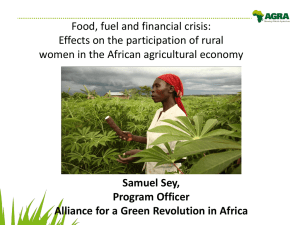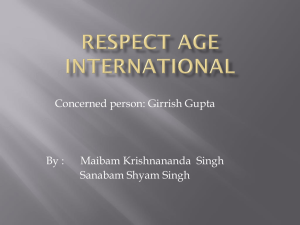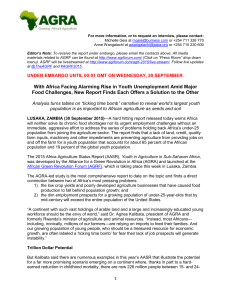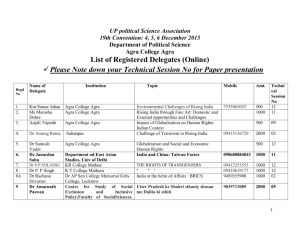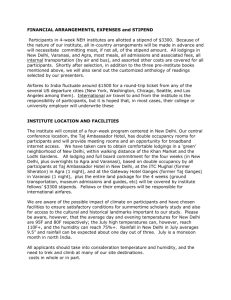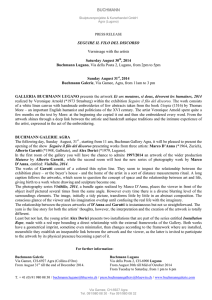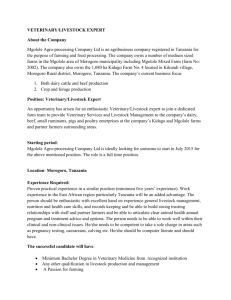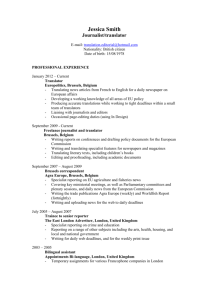the university of dodoma college of education department of
advertisement
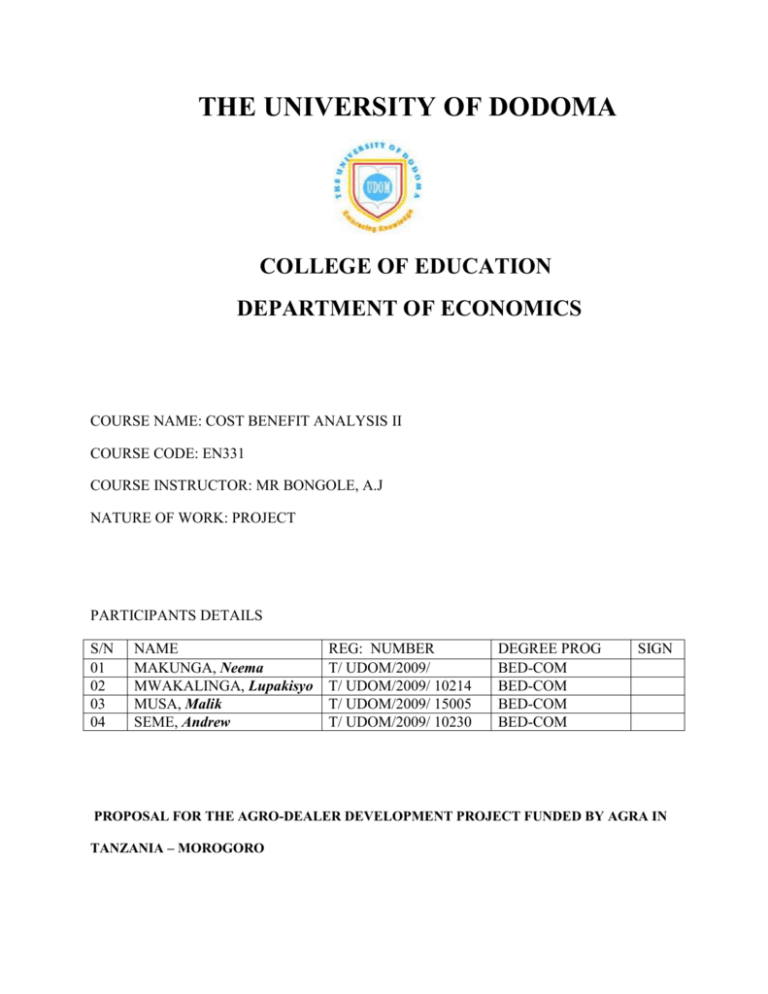
THE UNIVERSITY OF DODOMA COLLEGE OF EDUCATION DEPARTMENT OF ECONOMICS COURSE NAME: COST BENEFIT ANALYSIS II COURSE CODE: EN331 COURSE INSTRUCTOR: MR BONGOLE, A.J NATURE OF WORK: PROJECT PARTICIPANTS DETAILS S/N 01 02 03 04 NAME MAKUNGA, Neema MWAKALINGA, Lupakisyo MUSA, Malik SEME, Andrew REG: NUMBER T/ UDOM/2009/ T/ UDOM/2009/ 10214 T/ UDOM/2009/ 15005 T/ UDOM/2009/ 10230 DEGREE PROG BED-COM BED-COM BED-COM BED-COM SIGN PROPOSAL FOR THE AGRO-DEALER DEVELOPMENT PROJECT FUNDED BY AGRA IN TANZANIA – MOROGORO ABSTRACT…………………………………………………………………….………. 1 BACKGROUND OF INFORMATION……………………………………….………...2 METHODOLOGY AND APPROACH …………………………………………..……3 Study population………………………………………………………………….…….3 Project review framework……………………………………………………………….3 Project design……………………………………………………………………..….…4 Project relevance………………………………………………………………………...4 Effectiveness and efficiency…………………………………………………………….5 Impact and sustainability………………………………………………………………..5 Lesson learned………………………………………………………………………… .6 DATA COLLECTION METHOD………………………………………………….….6 Literature review………………………………………………………………………..6 Interview………………………………………………………………………………...6 Questionnaires…………………………………………………………………………..7 Observation……………………………………………………………………………..7 Direct informant method………………………………………………………………..7 Field work coordination………………………………………………………………...8 Sample framework and technique…………………………………………………....8 Sampling and sample size determination………….……………………………………8 DATA ANALYSIS………………………………………………………………….9 Data quality and synthesis…………………………………………………………..9 Stakeholders Discussion……………………………………………………………..9 TEAM COMPOSITION AND TASKS ASSIGNED………………………………10 Team composition………………………..………………………………..………..10 PROPOSED WORK PLAN………………………………………………………...11 THE PROJECT REVIEW REPORT PHASE…………………………………...13 Data presentation and/Discussion………………………………………………...13 Conclusion and Recommendation………………………………………………..13 APPRECIATION…………………………………………………..…………….14 PROFILE OF THE CONSULTANT (S) AND DETAILED CV………………..14-20 EXPECTATIONS FROM AGRA IN TERMS OF LOGISTICAL, TECHNICAL, AND OTHER FORMS………………………..…………………20-21 NAMES AND CONTACT INFORMATION OF REFEREE………………………21 REFERENCES………………………………………………………………………22 ABSTRACT: The main objective of this proposal is to strengthen agro-dealer network and to facilitate their access to agricultural inputs (fertilizer and improved seeds), better extension services, soil management practices, financing and linkages to cash markets The conceptual framework will be tested through a survey of community members, female and male in Morogoro. Morogoro municipal, the survey methodologies and approaches will be used are theoretical and empirical literature review,physical observation, meeting and discussions, Questionnaire survey and interview were also Documentary review conducted. 1.0. BACKGROUND OF INFORMATION The Alliance for a Green Revolution in Africa (AGRA) is a dynamic African-led organization that works in partnerships to help raise agricultural productivity and incomes of millions of smallholder farmers. Through the Soil Health Program (SHP), CNFA was provided with a two-year grant (2009-SHP 008) amounting to US$1,498,772 to implement an agro-dealer development project in Tanzania by linking rural smallholder farmers to a commercial network of over 1,200 rural, certified agro-dealers. The project’s main objective was to strengthen agro-dealer network and to facilitate their access to agricultural inputs (fertilizer and improved seeds), better extension services, soil management practices, financing and linkages to cash markets. AGRA’s vision is of a food secure and prosperous Africa achieved through rapid, sustainable agricultural growth based on smallholder farmers who are primarily engaged in the production of staple food crops in Africa. The main goals of AGRA by 2020 are to: i) Reduce food insecurity by 50 percent in at least 20 countries ii) Double the incomes of 20 million smallholder families and iii) Put at least 30 countries on track towards attaining and sustaining a uniquely African Green Revolution. The project ended in June 2011. 2.0. METHODOLOGY AND APPROACH 2.1 STUDY POPULATION The intension will be the AGRA beneficiaries especially for the projected implemented in Morogoro i.e Farmers, ministry of Agriculture, food security cooperatives. 2.2. PROJECT REVIEW FRAMEWORK The framework for project review conducted in Morogoro will focus on the following categories: project design, relevance, efficiency, effectiveness, impact and sustainability and against original project objectives, taking into account of the realities on the ground and the extent to which the project addressed the needs of its stakeholders. 2.2.1 PROJECT DESIGN 1.Through established projects in Morogoro met the intended programs objectives. 2.Through having resources in terms of physical and financial in terms of grants amounted to USD 498.772 financed for soil Health Program (SHP), does it adequate for project management and planned activities. 3.Through having partnership of AGRA Organization have been able to arrange and identify its roles and responsibilities in proper manner. 4. The projects implementers have been able to deliver planned resources and these resources were enough to deliver the intended results? 5. In case planned resources did not provided intended results, what were the intended causes i.e fund embezzlement, and external causes i.e climate change, social culture. 6. Through projects objectives have the projects generate any unintended results both positive and negative to the targeted project results. 7.What was extent successful of projects and that was due to what? 8. What were the recommendation on whether they were best to achieve the best project objectives? 2.2.2. PROJECT RELEVANCE The relevance of the project review proposal will base on the objectives of the project conducted concerned with meeting the requirement and needs of the project designer, implementers, the beneficiaries in development of Agriculture activities in Tanzania i Its relevance will base on the following evaluation questions: 1. The intended objectives have been attained? 2. The project was implemented as the way they designed concerning strategies process structure and instutional supposed to conduct the project? 3. Does the review help AGRA /HSP to be awere on success or not of agro-dealer model? 4. What key recommendation does AGRA should be given concerning in future similar ago-dealer development project in Tanzania? 5. How the project progress in developing a functional national agro-dealer network (TAGMARK). 2.2.3. EFFECTIVENESS AND EFFICIENCY The effectiveness and efficiency of the project will be proposed on the cost, inputs and results/outcomes of the project respectively. This will focus on the following criterion: 1. Does the costs meet the intended budget of the project? 2. Does inputs/resources used in proper way as they allocated in the project? 3. Beneficiaries are they aware and feel that projects are part and parcel of owns(sense of ownership)? 4. Have the planned benefits reach to the targeted group as the way they designed? 5. Did the implementation process take into account the environmental issues so as to bring sustainability? 6. Does the implementers have qualified knowledge and CV’s in the performing that project? 7. The institutional structure, time and duties assigned are they relationship to provide intended results? 2.2.4. IMPACT AND SUSTAINABILITY This will be viewed concerning the outcome of the project after have been implemented in few years. The impacts can be both positive and negative depending on social, cultural or financial, economic and environmental condition beneficiary saw after implementing the project. Our guiding question concerning impact and sustainability will focus on: 1. Does the beneficiaries such as farmer have the access concerning agricultural inputs (fertilizer and improved seeds) and extension services? 2. Does the market for agricultural product have been linked and financing so as to help farmer sell their product without problems? 3. Does the project help the beneficiary to increase their income and stand of living including access to education, food and saving? 4. Does the project have any negative impact such as invironment degradation, biodiversity loses and changing farmers original way of farming, what causes of it and possible solution? 5. Does the project bring sense of ownership to the beneficiaries such as farmers and other people within the society? 6. There is good relationship between institutional network, financing of project and other stakeholders such as farmers? 2.2.5. LESSON LEARNED In implemented of that project by AGRA there various things to be learned and that will be guided by the following: 1. What has been learned through project design and structures and evaluation technique? 2. What has been learned concerned with team composed and detailed CVs of the implementers of the projects? 3. What policy or sector should AGRA cooperate with in development better projects in future? 4. What ethical issues to be included in evaluating the project? 2.3. DATA COLLECTION METHOD In our proposed for project review, we will try to use various data collection methods by considering the resources and time availability and environmental where the data are needed to be collected. 2.3.1. LITERATURE REVIEW By reviewing various document through running the project and that will help to understand overall project plan, implementation, financing and expected outcome with respect to project goals and objectives. The literature will be viewed include project proposal, data bases, contracts, financial records and budgeting, inception report, evaluation report, field work and other project related files. 2.3.2.INTERVIEW: This will cover face to face conservation to various stakeholders such as farmers, partners, experts, in various field especially Agriculturist, statistician and psychologist. Through interview It will help to gather their opinions about the project in terms of project goals, achievements , challenges and expected result and outcomes. This will involves invitation of some of gradutes from college of education to undertake interview activities through surveying to various farmers , markets and how does financed activity progressed. 2.3.3. QUESTIONNAIRES Both open ended and closed ended questionnaires will be conducted in order to get relevant data from stakeholders. In order to run that program in time we will invite some our fellow undergraduate from various degrees offered at university of Dodoma in order to make that data collection method and more efficient and effectiveness. This will be followed by conducting one day seminar to train them about the aim of that work and costs through inviting them should be considered. 2.3.4. OBSERVATION This involves direct evidence of the eye to the place where the project was implemented and to the farmers and other stakeholders in order to witness what had been occurred. Through observation it will ensure both reliability and validity of information collected by AGRA programme. 2.3.5. DIRECT INFORMANT METHOD. This will be used to gather information from key project’s stakeholders, forexample Agro-dealer and inputs seller and inputs suppliers, specific service providers such as transport of Agricultural product and other stakeholders like farmers. 2.3.6. FIELD WORK COORDINATION To get high sensible results on that project review assignment while maintaining independence/neutrality, the review shall adopt a participatory approach, therefore the proposed methodology will entail consultantations and focus group discussion with key stakeholders and both desk review and field visits to the project implementation areas. Therefore to obtain primary data from the project’s beneficiaries, implementers and stakeholders in the project zones. A pre-visit and meeting should be conducted between the project coordinators and staff before undertaking the assignment that will help to be aware on the focus and direction of project review. After pre-visit team of staff should confirm on expected way of review process. The recruitment should be done according to the competence and familiarity with the assignment including partners and specific setting and environment for example skills in Agricultural evaluation project, data collectin and analysis. Also there should be assessor in order to assess the performance of staff activities that will help to monitoring and evaluate in a good manner. Field work will follow after identifying the responsible of staff, the field will involves direct contact with all stakeholders such as communities 3.0.SAMPLE FRAMEWORK AND TECHNIQUE 3.1 Sampling and sample size determination 3.1.1 Sample area / population: The AGRA project’s beneficiaries in Tanzania especially in Morogoro will form a sample frame, therefore through that also population included in the sample for all people in Morogoro.therefore to ensure that data collected are more meaningful to be used in that project review in relation with project objectives both probability and non probability sampling technique will be used such as simple random, systematic, multistage, convenience, judgemental and strategic sampling, that technique will be select various stakeholders. 3.1.2. Systematic sampling procedures Systematic sampling will done used depending to certain order from the list of population, this will help to select direct beneficiaries such as farmers and other household to provide their view on the implementation of AGRA projects. The criteria used in that sampling technique will be time and reduce cost of data collection activities in various villages and wards. 3.1.3. Judgemental sampling procedures Judgemental sampling will done to select sample which will help for the specific purpose. Sample may include project accurate recommendation depending on specific information on the implementation of the project. 3.1.4. Multistage sampling procedures Multistage will done to select districts, wards and villages on where the project implemented. The criteria used to select village and village in choosing sample size will include time, accessibility of the area and place where accurate data can be obtained. 4.0. DATA ANALYSIS In the analysis of the data finding the reported with respect to furnishing the evidence for each objective or question asked to make sure data collected in a certain quality and capture well to the information sources; the realibility and validity of data should be considered. The analysis can be done using SPSS, SAS, Excell, spreadsheet, and LIMDEP. 4.1.Data quality and Synthesis In order to make data are in certain quality, the consultants will compile and synthesis in appropriate to both questionnaires and interviews in respect to AGRA objectives. The quality information will analysed on the following grown of project relevance, efficiency, effectiveness, impact and sustainability, because from these informations the consultant can provide good recommendation, challenges, achievements of the projects 4.2.Stakeholders Discussion After data collected there should be discussion between consultants and project’s coordinators on information analysed for better understanding and ready to take an action. 5.0. TEAM COMPOSITION AND TASKS ASSIGNED 5.1. Team composition This involves brief profile and details CVs of consultants for project’s evaluation work from AGRA. The consultants are experienced in monitoring and evaluation, agricultural programming, project management, survey, economics, writing skills and budgeting . The review work will done in collaborative between us as a team of Cost-Benefit analysis and other experts from various field related to project review assignment such as Agriculture, Economics, and Research work. Through our team of Cost-Benefit Analysist and Economist we will lead the team in order to ensure role and responsibilities of quality work is attained.. Names and task assigned of staff are as follow below: Names of staff Area of expertise Position Task assigned assigned Mr Musa, M. Mr Mwakalinga, L. Ms Makunga, N. Surveys Team Leader Research Mobilization meeting Agriculture Analysis Assessments Data collection Report writing Team Leader Extension ser- Deputy team quality control vices Leader/survey documents review Agriculture Coordinator oversight data collection Surveys Analysis assessment Workshop coordinator Agriculture Economist/ Documents review Research Cost Benefit Analysis design of evalu- Surveys Analysis M&E aluation tools Development data collection Data Management and Analysis Mr Seme, A. Data Cleaning Report writing Surveys Agro Quality control Research Economist/ Preliminary documents Assessments Statistics Extension review screen services Mr Bongole,A.J. Draft Report Monitoring & Project Quality control Evaluation Management/ Logistics Project M&E Mobilization meeting Support workshop Management Development of data Policy analyst coordinator Facilitate the preparation of report. 6.0.PROPOSED WORK PLAN 1 Weeks Task Mobilizatio n meeting &Briefing 1 2 2 Weeks 3 5 6 7 9 3 Weeks 10 11 12 4 Weeks 13 14 15 16 17 18 19 20 Literature review Preliminary field visits Inception report Survey Tools Developme nt Training of field personnel FIELD PHASE Data collection ANALYSIS AND REPORTING PHASE Data entry & cleaning Data Analysis Validation Meeting/W orkshop Writing & submission final report 7.0.THE PROJECT REVIEW REPORT PHASE 7.1.Data presentation and/ Discussion The consultants through coordination of teams should presents findings based on assignment objectives and evaluation criteria such as relevance, efficiency and effectiveness. After presentation of findings to the project coordinators, there should be discussion among team of experts and project coordinator so as to provide accurate information to the implementation of projects and that should base on evidence of Data collection methods from AGRA project beneficiaries. 7.2 Conclusion and Recommendation 7.2.1 Conclusion After discussion among team of stakeholders there should reach to the conclusion so as to provide the chance for consultants to provide recommendation of further project implantation of AGRA in Tanzania. 7.2.2 Recommendation The proposed practical recommendation which are sufficient and accurate information to be provided to AGRA / SHP and partners should base on the following ground: What are the extent of project attaining objectives and what things limit to gain level of project outcome if any 1. Resources / inputs should be used in accurate manner and we insist the AGRA to raise financing in order to have good budget for project implementation. 2. The collaborate between private and public sector by AGRA should put into consideration in order to make project to be more efficient and effective. 3. The sense of ownership spirit should be encourage the beneficiaries in order to make AGRA project more meaningful. 4. In order to get accurate benefit and cost environmental goods should be identified to the project implemented areas and society as whole. 5. 8.0. APPRECIATION The consultants should recognize and accept the efforts of AGRA and to all staff whom support so much in providing initial information and logical facilitation to the consultants in performing their work in proper manner. 9.0.PROFILE OF THE CONSULTANT (S) AND DETAILED CV 1ST CONSULTANT 9.1.OBJECTIVES To become an effectives and productive in well conducting and organized a proposal in the agro-dealer development project funded by agra in tanzania – morogoro after getting an opportuinity. 9.2.PERSONAL PARTICULARS Surname : Seme, First name : Andrew, Date of birth :12th , October, 1984, Religion : Christian, Marital status : Single Age : 28 years, Sex : Male, Nationality : Tanzanian 9.3. CONTACTS: P.O BOX 118 KYELA – MBEYA TANZANIA E-mail: Aseme2011@gmail.com +255(0768)857911 9.4. LANGUAGE: English and Kiswahili – fluent in speaking, reading and writing. 9.5. EDUCATION QUALIFICATIONS PERIOD AWARDS INSTITUTIONS 2009-2011 Master in Economics The university of Dodoma 2005-2008 Barchelor Degree in Agricultural Sokoine University of Agriculture Economics 2004-2005 Advance Certificate for Secondary Mwakaleli Secondary School Education 2000-2003 Ordinary Certificate for Secondary Meta High School Education 1993-1999 Certificate for Primary Education Kabanga Primary School 9.6. WORK EXPERIENCE: Experience of 10 years in conducting project/program evaluations, particularly in the area of agricultural programming, cooperatives and Agro-dealer development. Experience in survey fieldwork (data collection, validation, entry and analysis) 9.7. COMPUTER SKILLS 2009/2011: Computer literate in the following program Introduction to computer Microsoft Word, Excel, Power Point, Database, Statistical data analysis, Internet and E-mail. Institute: The university of Dodoma. Award: : Included in Master of Economics 9.8. HOBBIES Watching Movies, reading novels and Books. Learning new ideas and exchanging views. Make and meet new friends 2ND CONSULTANT 9.3.OBJECTIVES To become an effectives and productive in well conducting and organized a proposal in the agro-dealer development project funded by agra in tanzania – morogoro after getting an opportuinity. 9.4.PERSONAL PARTICULARS Surname : Musah, First name : Malick, Date of birth :12th , October, 1985, Religion : Christian, Marital status : Single Age : 27 years, Sex : Male, Nationality : Tanzanian 9.3. CONTACTS: P.O BOX 118 KYELA – MBEYA TANZANIA E-mail: +255(0712)838274 9.4. LANGUAGE: English and Kiswahili – fluent in speaking, reading and writing. 9.5. EDUCATION QUALIFICATIONS PERIOD AWARDS INSTITUTIONS 2009-2011 Master in Economics The university of Dodoma 2005-2008 Barchelor Degree in Agricultural Sokoine University of Agriculture Economics 2004-2005 Advance Certificate for Secondary Mwakaleli Secondary School Education 2000-2003 Ordinary Certificate for Secondary Meta High School Education 1993-1999 Certificate for Primary Education 9.6. WORK EXPERIENCE: Kabanga Primary School Experience of 10 years in conducting project/program evaluations, particularly in the area of agricultural programming, cooperatives and Agro-dealer development. Experience in survey fieldwork (data collection, validation, entry and analysis) 9.7. COMPUTER SKILLS 2009/2011: Computer literate in the following program Introduction to computer Microsoft Word, Excel, Power Point, Database, Statistical data analysis, Internet and E-mail. Institute: The university of Dodoma. Award: : Included in Master of Economics 9.8. HOBBIES Watching Movies, reading novels and Books. Learning new ideas and exchanging views. Make and meet new friends 1ST CONSULTANT 9.5.OBJECTIVES To become an effectives and productive in well conducting and organized a proposal in the agro-dealer development project funded by agra in tanzania – morogoro after getting an opportuinity. 9.6.PERSONAL PARTICULARS Surname : Mwakalinga, First name : Lupakisyo, Date of birth :12th , October, 1984, Religion : Christian, Marital status : Single Age : 28 years, Sex : Male, Nationality : Tanzanian 9.3. CONTACTS: P.O BOX 336 KYELA – MBEYA TANZANIA E-mail: Mwaka2lupa@yahoo.com +255(0763)865594 9.4. LANGUAGE: English and Kiswahili – fluent in speaking, reading and writing. 9.5. EDUCATION QUALIFICATIONS PERIOD AWARDS INSTITUTIONS 2009-2011 Master in Economics The university of Dodoma 2006-2009 Barchelor Degree in Economics University of Dar es salaam 2005-2006 Advance Certificate for Secondary Songea Boys High School Education 2001-2004 Ordinary Certificate for Secondary Tukuyu secondary School Education 1994-2000 Certificate for Primary Education Kafundo Primary School 9.6. WORK EXPERIENCE: Experience of 10 years in conducting project/program evaluations, particularly in the area of cooperatives and Agro-dealer development. Experience in survey fieldwork (data collection, validation, entry and analysis) 9.7. COMPUTER SKILLS 2009/2011: Computer literate in the following program Introduction to computer Microsoft Word, Excel, Power Point, Database, Statistical data analysis, Internet and E-mail. Institute: The university of Dodoma. Award: : Included in Master of 9.8. HOBBIES Watching Movies, reading novels and Books. Learning new ideas and exchanging views. Make and meet new friends 10. EXPECTATIONS FROM AGRA IN TERMS OF LOGISTICAL, TECHNICAL, AND OTHER FORMS The expectation we want to reach from AGRA/ soil health programs and partners with sufficient and accurate information to make an informed judgement about the past performance of the project. The another expectation we want to reach from AGRA we shall look on the level of achievements on activities, outputs, outcomes and the overall level objectives as stated in the documents if are incremental and reached. Well implementation strategies and process/ structures, including so as to achieve the project objectives like: 1. To strengthen Agro-dealer network and to facilitate their access to Agricultural inputs (fertilizers and improved seeds). 2. Better extension services 3. Soil management through the Soil Health Program (SHP). 4. Financing and linkage of cash Markets Also the expectation from AGRA / SHP must understand the success or not of the Agro- dealer Model and the substantiality of the achievements from the investment. The expectation from AGRA shall deals with the progress in developing a functional national Agro- dealer Network (TAGMARK). 10.0. NAMES AND CONTACT INFORMATION OF REFEREE Name of referee: MR Abiud J. Bongole, Contact information of referee: P.O BOX 118 DODOMA TANZANIA E-mail: Bongoleaj@yahoo.com +255(0785)867766 REFERENCES AGRA (2011). Terms of references to conduct an end of project review for the agrodealer development project funded by AGRA in Tanzania-Morogoro, Nairobi, AgraAlliance. Omari, M. (2011), Concept and Methods in Educational Research, A practical guide Based Experience. Dar es salaam. OUP. AGRA (2011). Agra Dead Project Evaluation Guideline, Kenya: Agra-Alliance.
